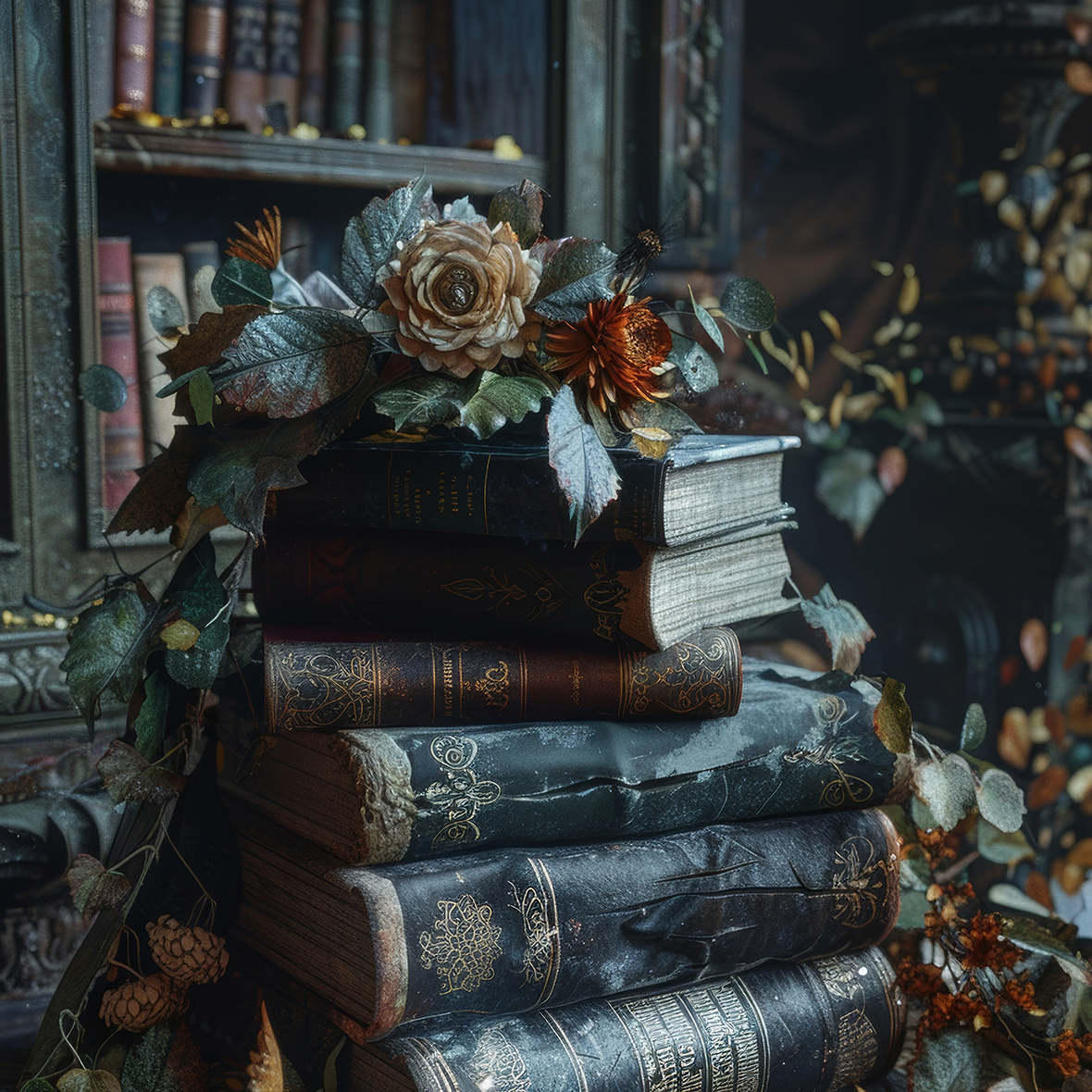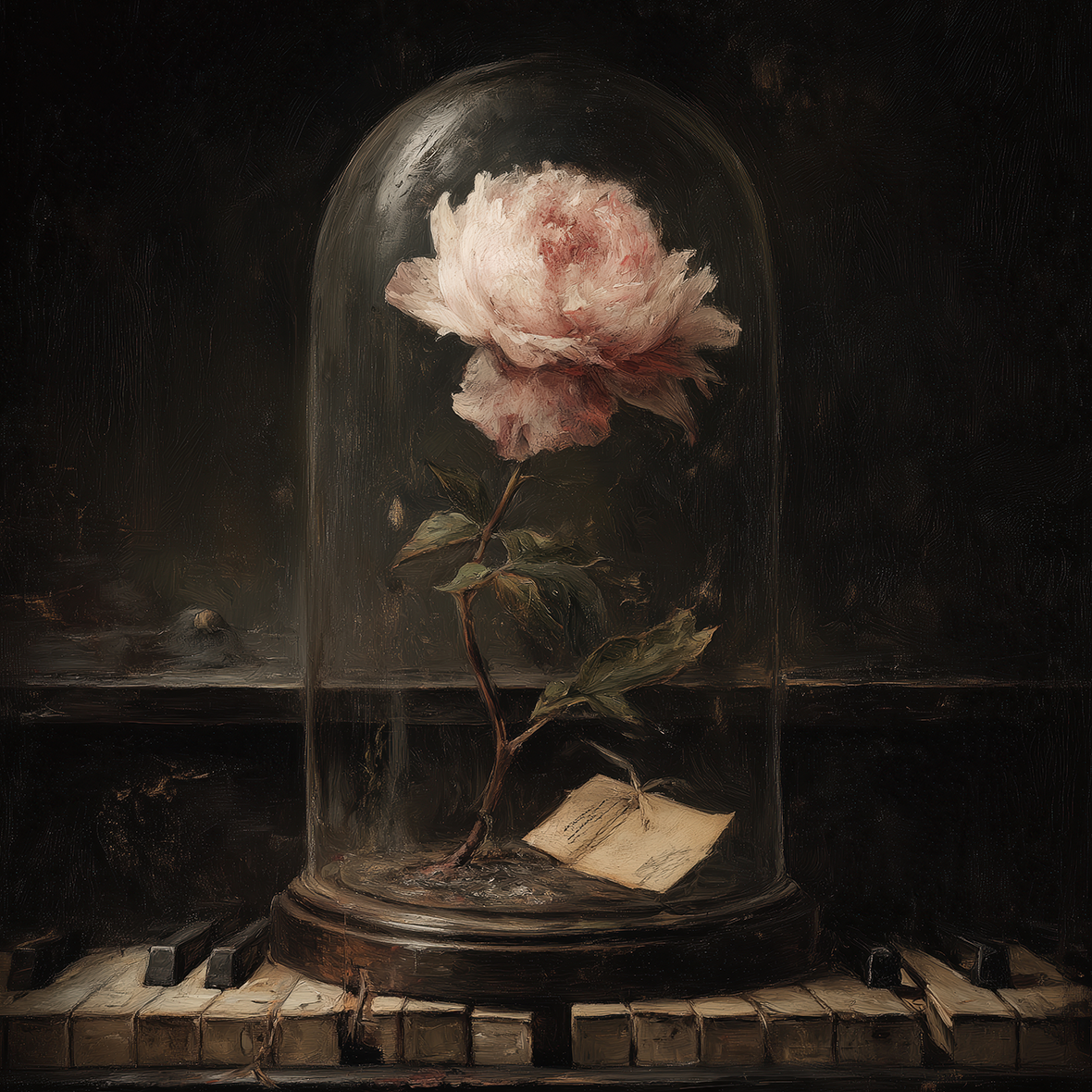Evening Primrose
Some spirits linger not out of sorrow but devotion. In the quiet corners of an old library, where moonlight pools on marble floors and memory clings to the bindings of forgotten books, she waits. Evening Primrose is not a specter to fear but a guardian of the lost—a whisper in the stacks, a floral trace on the air, a story unfinished. Her presence is a balm for the brokenhearted, a turning page for the ones who read between the lines. She is the scent of grief softened by kindness. The hush that speaks volumes.
Scent Profile
Top: Peach, Plum
Heart: Peony, Violet
Base: Leather, Patchouli, Vanilla, Musk
Scent Profile
Top: Peach, Plum
Heart: Peony, Violet
Base: Leather, Patchouli, Vanilla, Musk

Evening Primrose
Some stories refuse to be forgotten…
There is a hush in every library, but in the shadowed halls of Hoskins, that silence breathes. Built of limestone and ambition, the grand edifice of Hoskins Library has stood for nearly a century, its Gothic spires and arched windows watching the world blur past just outside. Inside, however, time holds its breath. Dust motes drift like memories in the shafts of moonlight, and rows of ancient books line the walls like sentinels of secrets.
Somewhere among those shelves, she lingers.
They call her Evening Primrose, a name not found in any registry, etched only in whispers passed between custodians, late-night researchers, and curious students who dared to wander too far after hours. Some say they saw her out of the corner of their eye—a figure in soft violet, hair pinned with pearl combs, gliding silently down the fiction aisle. Others heard her: the faint rustle of skirts, the click of heels on marble, the quiet closing of a book in a darkened corner.
But all agree on one thing—she is always surrounded by the scent of something floral and faintly sweet as plum wine spilled on yellowed parchment.
The oldest tale claims she was once a librarian—devoted, dignified, and doomed. She cataloged the forbidden books, the ones locked away in the dustiest recesses, bound in leather so old it cracked like autumn leaves. She had a particular fondness for poetry and always read alone in the eastern alcove where the light fell just right at dusk. But one evening, she never came out.
They searched the entire library. Found her glasses on the desk. Found her ledger open to a page she'd never finish. But no sign of her. The only trace was a sudden bloom of scent—violet, peach, and something darker—lingering in the air for hours after they closed the doors. Her name was erased from the records. Some say intentionally. Some say it was never written at all.
As the decades passed, the sightings persisted. In fact, they became more frequent and more specific. Students in the archives often report feeling a sensation of being watched, especially when researching family histories. A literature professor once claimed that pages of a volume of Keats turned on their own. When asked, he whispered, "I think she liked that one."
She appears most often to those who are lost—not just physically but emotionally adrift. The student grieving a parent. The widow tracing her lineage in the genealogy room. The night janitor still mourning a sister taken too young. Evening Primrose walks softly in their periphery, never speaking, never touching. But when they leave, they often find a book tucked into a coat pocket or slipped beneath an arm—one they never checked out, one they don't remember touching.
And always, always, the book holds a pressed flower: a primrose, fragile as breath, untouched by time.
Once, a young man brought his fiancée to the reading room to show her where he used to study. As they passed the poetry shelves, the woman stopped abruptly. "Who's that?" she asked, pointing toward the alcove. The man saw no one. But she described a woman in violet, standing beneath the window light, watching them with a look of profound sadness—and perhaps envy.
Skeptics call it mass hysteria. A story born from stress and sleepless nights. But even they admit the odd sensations: temperature shifts in the stacks, the sudden scent of leather and lavender when no one is near, lights flickering only when poetry books are disturbed. One professor tried to disprove the legend by spending the night in her alcove. He laughed when the lights dimmed and scoffed when the wind moaned through the leaded glass.
By morning, he was pale and trembling. He wouldn't speak of what he saw and left the university within the week.
Others tried more tender approaches. One intern left a teacup of primroses on the alcove table, along with a handwritten note: For Evening Primrose, with thanks. The next day, the cup was gone—but a fresh-cut sprig of lavender was found in its place. The intern never returned to the library but kept the lavender pressed in her journal until the day she died.
Occasionally, the cataloging system falters. Books marked "lost" reappear when needed most. A grieving professor once found a long-missing book of elegies sitting on his desk, though no one claimed to have brought it. Another visitor, heart heavy with regret, stumbled across a first edition volume of unpublished love poems—listed nowhere in the system—resting on a shelf he hadn't approached. He swore the book glowed faintly as if warmed by invisible hands.
There are stories of her appearing in mirrors, always over the shoulder, always looking just past the reflection. Some staff members refuse to clean the alcove after dusk, citing shadows that don't align with their bodies or the gentle creak of a rocking chair that is no longer there.
One evening, a child's voice echoed faintly in the reading room—reciting something like a lullaby. No children were present. When investigated, a dusty anthology of children's verse lay open on the table, turned to a poem titled Primrose Wishes. The circulation card inside had no entries at all. The poem was about a girl who dreamed herself into the roots of a library tree, where books whispered, and petals fell like snow.
Lately, a theory has taken hold—one shared only between the most trusted librarians and those with hearts sensitive to the peculiar and the unseen. They believe Evening Primrose remains because no one truly heard her while she lived and that her disappearance wasn't an accident but a vow. A return to the pages where she felt most herself. Each book she leaves behind is a shard of her spirit, gently offered to those in pain as if to say, 'You are not alone in your sorrow.'
A custodian once found a handwritten poem tucked into a vacant chair. It wasn't signed, but at the bottom was a tiny drawing of a primrose.
I asked the moon to keep me near,
To wrap me tight in dusk and fear.
But books became my grave and light,
And here I bloom through endless night.
Other verses have surfaced since, scribbled in the margins of check-out slips. Scrawled in soft pencil in the back covers of forgotten volumes. Each in the same slanted hand. Each ending in a pressed flower, delicate and impossible, as though placed only seconds before discovery.
Not long ago, during a storm that knocked out power to the city, several students stayed late, tucked into corners with candles and flashlights. In the dim silence, someone began to hum—a tune unfamiliar, old-fashioned, haunting. No one would admit to starting it. Yet they all remembered the same song.
That night, a new plaque appeared on the alcove wall. No one commissioned it. The custodians swear they didn't install it. But there it was, polished brass, etched in delicate script:
Evening Primrose
Librarian of the Lost
Patron Saint of the Unquiet Heart
The administration had it removed. But within a week, it returned. Three times.Eventually, they left it alone.
Evening Primrose is more than a ghost. She's an archivist of emotion. A keeper of the unspoken. A reminder that some stories endure—not because they are loud, but because they are true. She is sorrow given form, kindness left behind, and the gentle echo of pages turning in the dark.
This story is for the readers. The wanderers. The quiet ones who find solace in corners and meaning in margins. For those who believe that the dead may walk beside us—not to haunt, but to remind us: memory, love, and language are stronger than silence.
So if you ever find yourself in the library after hours, drawn toward a particular corner, don't be afraid. Breathe deeply. Trust your footsteps.
Open a book. And listen.
You just might hear her turning the page.
There is a hush in every library, but in the shadowed halls of Hoskins, that silence breathes. Built of limestone and ambition, the grand edifice of Hoskins Library has stood for nearly a century, its Gothic spires and arched windows watching the world blur past just outside. Inside, however, time holds its breath. Dust motes drift like memories in the shafts of moonlight, and rows of ancient books line the walls like sentinels of secrets.
Somewhere among those shelves, she lingers.
They call her Evening Primrose, a name not found in any registry, etched only in whispers passed between custodians, late-night researchers, and curious students who dared to wander too far after hours. Some say they saw her out of the corner of their eye—a figure in soft violet, hair pinned with pearl combs, gliding silently down the fiction aisle. Others heard her: the faint rustle of skirts, the click of heels on marble, the quiet closing of a book in a darkened corner.
But all agree on one thing—she is always surrounded by the scent of something floral and faintly sweet as plum wine spilled on yellowed parchment.
The oldest tale claims she was once a librarian—devoted, dignified, and doomed. She cataloged the forbidden books, the ones locked away in the dustiest recesses, bound in leather so old it cracked like autumn leaves. She had a particular fondness for poetry and always read alone in the eastern alcove where the light fell just right at dusk. But one evening, she never came out.
They searched the entire library. Found her glasses on the desk. Found her ledger open to a page she'd never finish. But no sign of her. The only trace was a sudden bloom of scent—violet, peach, and something darker—lingering in the air for hours after they closed the doors. Her name was erased from the records. Some say intentionally. Some say it was never written at all.
As the decades passed, the sightings persisted. In fact, they became more frequent and more specific. Students in the archives often report feeling a sensation of being watched, especially when researching family histories. A literature professor once claimed that pages of a volume of Keats turned on their own. When asked, he whispered, "I think she liked that one."
She appears most often to those who are lost—not just physically but emotionally adrift. The student grieving a parent. The widow tracing her lineage in the genealogy room. The night janitor still mourning a sister taken too young. Evening Primrose walks softly in their periphery, never speaking, never touching. But when they leave, they often find a book tucked into a coat pocket or slipped beneath an arm—one they never checked out, one they don't remember touching.
And always, always, the book holds a pressed flower: a primrose, fragile as breath, untouched by time.
Once, a young man brought his fiancée to the reading room to show her where he used to study. As they passed the poetry shelves, the woman stopped abruptly. "Who's that?" she asked, pointing toward the alcove. The man saw no one. But she described a woman in violet, standing beneath the window light, watching them with a look of profound sadness—and perhaps envy.
Skeptics call it mass hysteria. A story born from stress and sleepless nights. But even they admit the odd sensations: temperature shifts in the stacks, the sudden scent of leather and lavender when no one is near, lights flickering only when poetry books are disturbed. One professor tried to disprove the legend by spending the night in her alcove. He laughed when the lights dimmed and scoffed when the wind moaned through the leaded glass.
By morning, he was pale and trembling. He wouldn't speak of what he saw and left the university within the week.
Others tried more tender approaches. One intern left a teacup of primroses on the alcove table, along with a handwritten note: For Evening Primrose, with thanks. The next day, the cup was gone—but a fresh-cut sprig of lavender was found in its place. The intern never returned to the library but kept the lavender pressed in her journal until the day she died.
Occasionally, the cataloging system falters. Books marked "lost" reappear when needed most. A grieving professor once found a long-missing book of elegies sitting on his desk, though no one claimed to have brought it. Another visitor, heart heavy with regret, stumbled across a first edition volume of unpublished love poems—listed nowhere in the system—resting on a shelf he hadn't approached. He swore the book glowed faintly as if warmed by invisible hands.
There are stories of her appearing in mirrors, always over the shoulder, always looking just past the reflection. Some staff members refuse to clean the alcove after dusk, citing shadows that don't align with their bodies or the gentle creak of a rocking chair that is no longer there.
One evening, a child's voice echoed faintly in the reading room—reciting something like a lullaby. No children were present. When investigated, a dusty anthology of children's verse lay open on the table, turned to a poem titled Primrose Wishes. The circulation card inside had no entries at all. The poem was about a girl who dreamed herself into the roots of a library tree, where books whispered, and petals fell like snow.
Lately, a theory has taken hold—one shared only between the most trusted librarians and those with hearts sensitive to the peculiar and the unseen. They believe Evening Primrose remains because no one truly heard her while she lived and that her disappearance wasn't an accident but a vow. A return to the pages where she felt most herself. Each book she leaves behind is a shard of her spirit, gently offered to those in pain as if to say, 'You are not alone in your sorrow.'
A custodian once found a handwritten poem tucked into a vacant chair. It wasn't signed, but at the bottom was a tiny drawing of a primrose.
I asked the moon to keep me near,
To wrap me tight in dusk and fear.
But books became my grave and light,
And here I bloom through endless night.
Other verses have surfaced since, scribbled in the margins of check-out slips. Scrawled in soft pencil in the back covers of forgotten volumes. Each in the same slanted hand. Each ending in a pressed flower, delicate and impossible, as though placed only seconds before discovery.
Not long ago, during a storm that knocked out power to the city, several students stayed late, tucked into corners with candles and flashlights. In the dim silence, someone began to hum—a tune unfamiliar, old-fashioned, haunting. No one would admit to starting it. Yet they all remembered the same song.
That night, a new plaque appeared on the alcove wall. No one commissioned it. The custodians swear they didn't install it. But there it was, polished brass, etched in delicate script:
Evening Primrose
Librarian of the Lost
Patron Saint of the Unquiet Heart
The administration had it removed. But within a week, it returned. Three times.Eventually, they left it alone.
Evening Primrose is more than a ghost. She's an archivist of emotion. A keeper of the unspoken. A reminder that some stories endure—not because they are loud, but because they are true. She is sorrow given form, kindness left behind, and the gentle echo of pages turning in the dark.
This story is for the readers. The wanderers. The quiet ones who find solace in corners and meaning in margins. For those who believe that the dead may walk beside us—not to haunt, but to remind us: memory, love, and language are stronger than silence.
So if you ever find yourself in the library after hours, drawn toward a particular corner, don't be afraid. Breathe deeply. Trust your footsteps.
Open a book. And listen.
You just might hear her turning the page.


-Photoroom.jpg)

